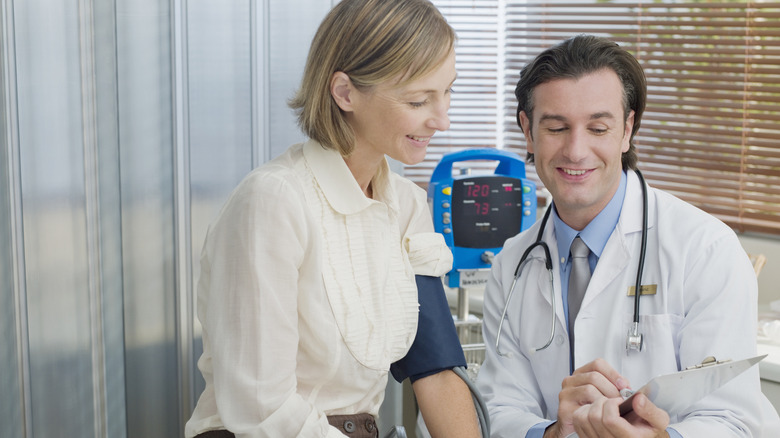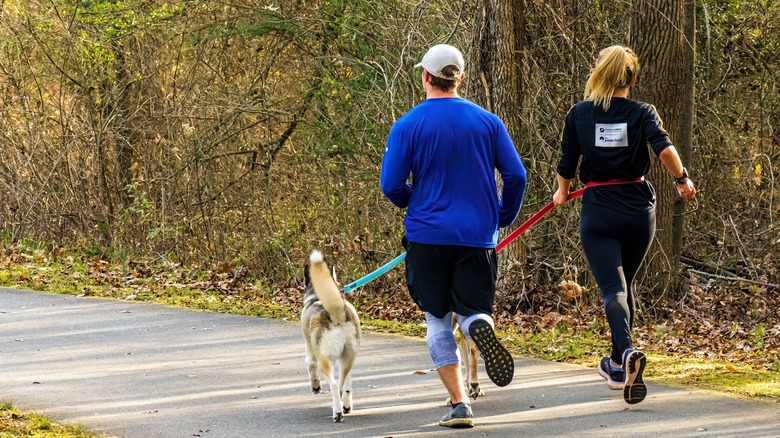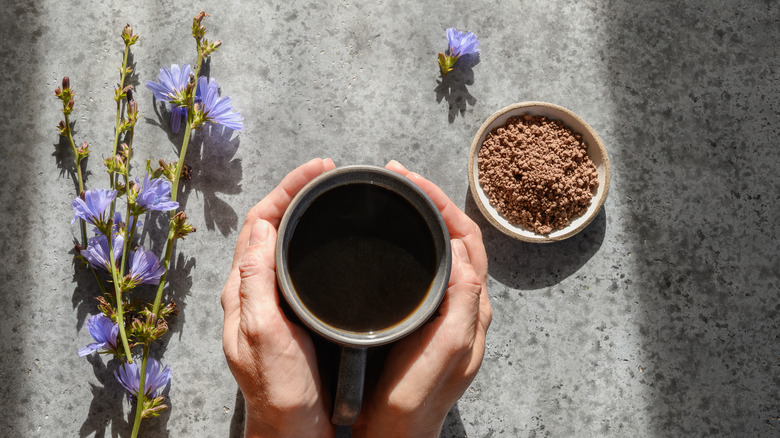How To Fix High Blood Pressure Without Medication
High blood pressure, or hypertension, affects nearly half of U.S. adults, contributing to the burden of heart disease. "With the aging of the population and increased life expectancy, the prevalence of high blood pressure is expected to continue to increase," epidemiologist Paul Muntner told the American Heart Association (AHA). If left untreated, this sneaky condition can lead to kidney disorders, vascular dementia, stroke, and other health issues, according to the National Institute on Aging (NIA).
The problem is that hypertension rarely has any symptoms — though, in some cases, it may cause chest pain, difficulty breathing, blurred vision, nosebleeds, or headaches, according to the British Heart Foundation. Given this aspect, it's important to check your blood pressure regularly, especially if you're at risk. Generally, hypertension is more common in older adults, people with a family history of high blood pressure, African Americans, and postmenopausal women, notes the NIA.
If you have this condition, your doctor may prescribe antihypertensive drugs, diuretics, or other medications. However, these medicines carry potential side effects ranging from fatigue and dizziness to palpitations and depression, says the AHA. On the positive side, it may be possible to bring your blood pressure down without popping pills. Small lifestyle changes, such as getting more shuteye and cutting back on caffeine, can make all the difference.
Commit to regular exercise
For starters, try to squeeze more exercise into your schedule. As it turns out, physical activity can cause "modest but consistent" reductions in blood pressure, notes a 2018 review published in the British Journal of Sports Medicine. After investigating nearly 400 studies, researchers concluded that regular exercise can be just as effective as most medications recommended for high blood pressure. What's more, it may lower the risk of heart disease by up to 27%, facilitate weight loss, and improve blood lipids.
Obesity is a major risk factor for hypertension and heart disease. This factor accounts for 65% to 75% of the risk of developing high blood pressure, according to clinical evidence presented in Circulation Research. If you're on the heavier side, even the slightest weight loss may improve your blood pressure — and that's where regular exercise can help. Johns Hopkins Medicine says that losing just 7.7 pounds may lower your risk for high blood pressure by 50% or more.
However, this doesn't mean you have to hit the gym daily or go jogging every morning. There are plenty of workouts you can do at home, and some require little or no equipment. Brisk walking, dance classes, biking, and other activities count as exercise, too. If you're short on time, the American Council on Exercise recommends breaking up your workouts into smaller chunks, such as three 10-minute sessions per day.
Cut back on caffeine and alcohol
Both caffeine and alcohol can raise blood pressure, especially when consumed in large amounts. The former may cause a "short but dramatic increase" in blood pressure, but its effects vary among individuals, notes the Mayo Clinic. To stay on the safe side, try not to exceed 200 milligrams of caffeine per day and avoid coffee, energy drinks, black tea, or other caffeinated beverages before exercise.
Better yet, swap your daily cup of Java for chicory coffee, a herbal beverage that may lower blood pressure in just four weeks, according to a 2015 study published in the Journal of Traditional and Complementary Medicine. This drink also has beneficial effects on blood sugar and insulin levels, digestive function, and metabolic health. Inulin, a prebiotic in chicory root, promotes regularity and can improve your body's ability to break down and use glucose for energy.
Cutting back on alcohol is just as important for managing blood pressure. In clinical trials, heavy drinking has been shown to initially lower blood pressure for up to 12 hours and then increase it for up to 24 hours, reports the Cochrane Database of Systematic Reviews. These effects were observed in women who consumed more than 20 grams of alcohol in one sitting, as well as in men who drank at least 30 grams of alcohol at once. For reference, a standard can of beer or a glass of wine has around 14 grams of alcohol (per Chateau Grand Traverse).
Tweak your diet, sleep, and stress level
As mentioned earlier, blood pressure management doesn't necessarily require major lifestyle changes. Like with most things, it's all in the details. For example, reducing your sodium intake by one-third can significantly lower high blood pressure and decrease heart disease and stroke risk by up to 80%, according to clinical research published in the Archives of Medical Science. Health experts also recommend cutting back on fat, eating plenty of fruits and vegetables, and quitting smoking, among other measures.
A good starting point is to follow the DASH diet, suggests the above review. This eating pattern can reduce blood pressure in just 14 days and improve blood lipids, notes the Mayo Clinic. Most meals are rich in fruits, vegetables, legumes, lean meat, fish, nuts, and other low-fat, low-sodium foods with high potassium levels. The diet also limits sugary foods, soft drinks, fatty meats, and full-fat dairy.
Last but not least, try to get more sleep and limit stress. Sleep deprivation may increase blood pressure and heart rate in hypertensive patients, leading to a higher risk of heart disease, suggests an earlier study featured in the American Journal of Hypertension. Moreover, even mild but regular sleep disturbances can negatively affect blood pressure and trigger an inflammatory response, according to a research article published in the Journal of the American Heart Association. Also, note that stress can impact your sleep, diet, and workout routine, making it harder to keep your blood pressure under control.




